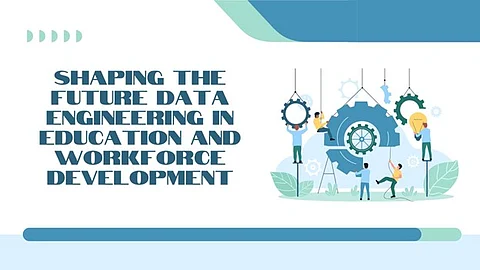

In the rapidly advancing digital era, Mahendra Pudi, a seasoned expert in data engineering, explores how breakthroughs in data engineering are transforming education and workforce development. This article highlights pivotal innovations, including curriculum redesign, workforce upskilling, and the integration of AI/ML technologies, addressing the challenges of a dynamic, data-driven global landscape across industries, educational institutions, and community-focused initiatives.
The exponential growth of data has created an unprecedented demand for skilled data engineers across various industries. Predictions indicate that by 2025, global data production will reach 175 zettabytes, with 30% requiring real-time processing for critical operations. This surge is driving organizations to prioritize scalable data infrastructures, invest heavily in expertise, and advanced systems supporting efficiency. Data engineers are now pivotal in building robust systems, and salary trends reflect their value, with annual increases averaging 12% over the last three years, underscoring their importance in modern enterprises.
Modern data engineering education emphasizes a balanced approach to technical, experiential, and crucial soft skills. Emerging curriculums integrate the extensive technical training with practical experience in cloud platforms, big data technologies, and ETL/ELT pipelines to prepare students for industry needs. Students devote more than 70% of their learning hours to hands-on projects, simulating real-world enterprise scenarios using advanced tools. Increasingly, soft skills like data ethics, communication, and analytical problem-solving are in vogue. Graduates can now be well-prepared for complex professional environments and align with employer expectations in competitive markets. Simulation environments have increasingly been adopted by institutions to enhance the practical relevance of student learning.
Data literacy has become an important skill for any learner, cutting across all types of educational settings. Integrating data projects into school curriculums has the impact of improving critical thinking, quantitative reasoning, and cross-disciplinary learning outcomes for students. For adult learners, community-based programs and online platforms are bridging the gap in terms of skills acquired with a focus on accessible application-driven curriculums enabling better opportunities. This initiative has proven particularly effective in underserved regions, having improved participant confidence and completion rates significantly while opening pathways for professional and educational advancement in technology-driven environments. Those projects targeting economically underprivileged communities really have a profound impact on overall inclusion in the data-intensive professions.
Organizations are heavily investing in upskilling their teams as the industry demand is changing everywhere around the globe. Structured training programs lead to increased rates of project completions, lesser operational inefficiencies, and more collaborative teams on data engineering projects. Cloud skills and multi-cloud skills are increasingly critical as professionals command high salary premiums with experience in distributed systems. Mentorship programs are also important because they are seen to be very effective for faster skill acquisition, employee retention, and talent pipeline building and sustaining organizational structure. With workforce capabilities more in tune with such technological advancements, organizations are set up to achieve scale with competitive performance. The focus of upskilling efforts extends to non-technical skills, including agile methodologies and team-based problem-solving.
Although the need for advanced data engineering education is well-defined, there are still many implementation challenges that require immediate attention. One of the major hurdles that institutions and organizations face is the challenge of keeping curriculums updated with rapidly evolving technologies. Cloud-based learning environments are emerging as a solution that provides scalability, reduces maintenance costs, and increases student access to critical resources. Industry partnerships will only continue to blur lines even more so, thus curriculums that focus on industry need will ensure skills acquired will address real needs, minimize technical debt, and make way for the continued innovations required in these advancements. Long-term investment in both faculty training and technology is going to have to be done.
AI/ML technologies are remapping data engineering and global changes. This is leading companies to increasingly invest in automated data pipelines, ensuring that they improve data quality and reduce processing time, which consequently enhances operational efficiencies. Modular learning approaches and AI-augmented workflows are generally set up to ensure that professionals do not leave their workplaces or traditional learning environments to enhance their skills. Security and data governance are also becoming priorities, with increased investments in compliance and privacy-focused training to deal with emerging challenges in global regulatory landscapes. Virtual labs and simulation technologies, for instance, are paving their way into providing immersive learning.
In conclusion, Mahendra Pudi says, "The revolution in data engineering education and the development of its workforce requires joint efforts." Integrate technical with soft skills; focus on applications in real-life scenarios; promote industry partnerships as these programs put people ready for a data-driven future. Data engineering will continue to shape education and workforce strategies in keeping with the focal points of adaptability, AI integration, and continuous learning. In doing so, data engineering will focus on sustaining readiness for the challenges and opportunities of the digital age while addressing the societal and organizational needs that are presented and fulfilled through this process.
